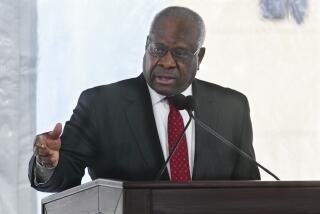He Didn’t Want Artificial Life but Feeding Tube Stays : Judge Overrules Patient’s ‘Death Wish’
- Share via
DEDHAM, Mass. — A judge ruled today in a controversial “death-wish” case that a comatose firefighter must be kept alive through a feeding tube in his stomach despite his wife’s wishes that he be allowed to starve to death and her statements that he opposed such life-saving measures.
Probate Judge David H. Kopelman issued the 44-page decision, which was long awaited in both legal and medical circles.
New England Sinai Hospital physicians “are permanently enjoined from either removing or clamping Paul E. Brophy’s gastrostomy tube for the purpose of denying Brophy hydration or nutrition required to sustain his life,” Kopelman said in Norfolk County Probate Court.
Brophy, 48, of Easton, lapsed into a coma in March, 1983, 10 days after suffering an aneurysm, a swollen blood vessel in the brain. He underwent surgery at a medical center in Boston, but never regained consciousness.
Brophy was later transferred to New England Sinai Hospital in Stoughton, where he has been given food and water through a tube inserted into his stomach.
His wife, Patricia, maintained that her husband never wanted to be kept alive artificially. Last November, she requested that the hospital remove the tube and end all life-support systems.
“He always said, ‘When your ticket’s punched, it’s punched,’ ” Patricia Brophy said recently.
In his ruling, Kopelman said, “A society that rejects euthanasia, the selected killing of the unfit, the insane, the retarded and the comatose patient, is morally obligated to sustain the life of an ill human being, even one in a persistent vegetative state.”
In testimony last spring, Brophy’s brother, Leo M. Brophy Sr., also said his brother did not want to be kept alive artificially.
“Paul said, ‘If I’m ever that way just shoot me, pull the plug,’ ” Leo Brophy said.
Patricia Brophy earlier cited a “right-to-die” policy passed by the Massachusetts Medical Society in September.
The organization endorsed a policy recognizing the rights of the terminally ill and “vegetative” patients to reject life-sustaining treatment, including artificial feeding, said Charles Amorosino, the society’s executive director.
In recent months several states have dealt with the issue by adopting “living wills” laws, in which patients can state in advance whether they want to be kept alive with life-support systems.
More to Read
Sign up for Essential California
The most important California stories and recommendations in your inbox every morning.
You may occasionally receive promotional content from the Los Angeles Times.













